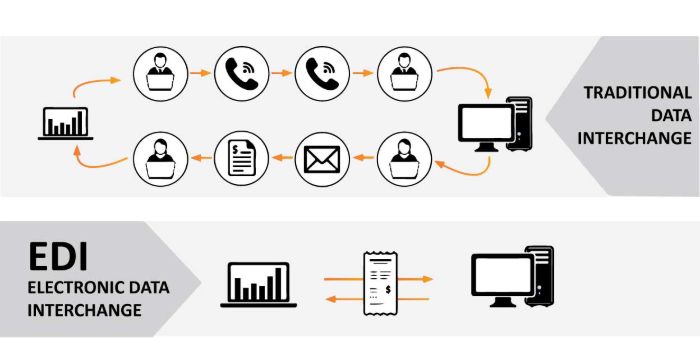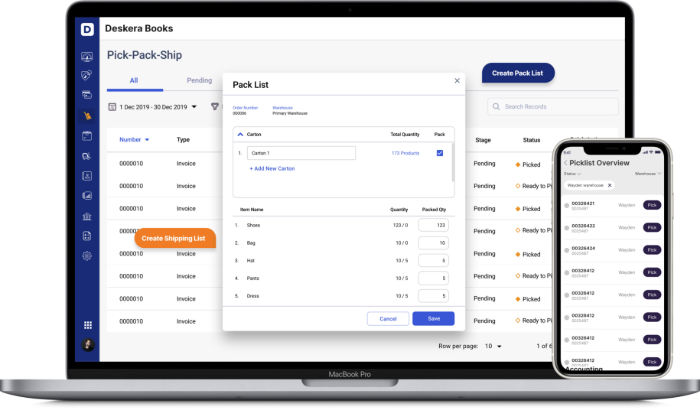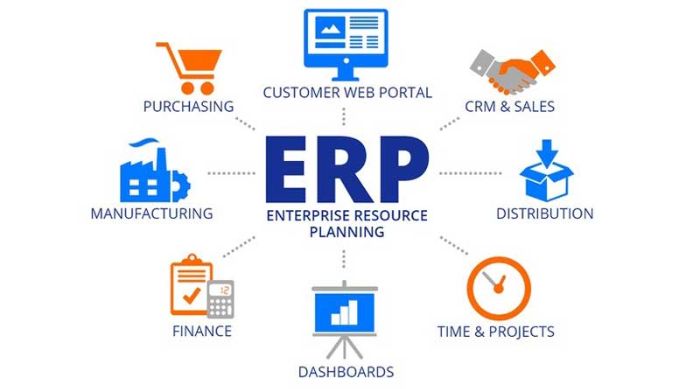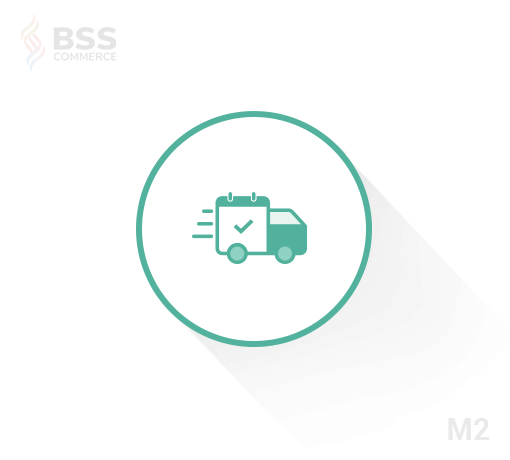According to forecasts, the B2B market will grow strongly in 2021, which means the number of B2B customers will skyrocket. The massive amount of B2B orders is genuinely a challenge in order management.
Let’s find a way to turn this challenge into an opportunity with B2B order management systems!
The Definition of Order Management
Table of Contents

If you’ve run a business, you must’ve already got the hang of order management meaning.
Order management is the process of validating and tracking received orders as well as fulfilling the order requirements.
A normal order management system consists of various steps:
- Receive orders automatically for eCommerce or import orders manually by sales representative account.
- Order confirmation is sent to the customer.
- After receiving the confirmation, the system saves the order to the management list.
- Orders continue to be transferred to the production/packaging departments, respectively.
- The system sends customers to notify the shipment of orders.
- Orders reach the recipient via courier.
A. Order Management for B2B Store Owners & Businesses
What is a B2B order management system?

The B2B order management system is a system to manage and support the fast ordering, checking of goods, synthesizing and issuing orders.
There are five popular order management systems for wholesale purposes:
- eCommerce platform backend (e.g Magento 2).
- Spreadsheet (for manual).
- Standalone order management software.
- Enterprise Resource Planning (ERP) software.
- Retail and B2B operations platforms.
Order management: 4 challenges for B2B businesses

Are you confident with your business’s ability of B2B order management?
Here are some of the most challenging problems for any B2B order management system to solve. Let’s take a look to see if your system could pass these challenges.
1. EDI requirements from high-value B2B customers

The development of technology has contributed significantly to changing the goods management process.
Traditional internal supply chains are now obsolete. Now is the time when the supply chain EDI (Electronic Data Interchange) to the throne promises to bring many benefits to B2B customers.
EDI is the new way to exchange data and transactions via electronic format, which is assessed for high security and fast transmission speed. In addition, EDI has been applied by many large and medium enterprises in a single management model.
Even third-party shipping companies (3PLs) and countless dropshipping businesses have been adopting this approach to their order management model.
Using an EDI built-in order management system offers a wealth of benefits, with the most significant advantage being synchronization. You can send e-invoices directly to shipping services without going through manual methods such as paper and fax.
Suppose your partner is a sizable B2B business, in the “high-value customer” segment. In that case, applying EDI will bring an absolute advantage when negotiating with them thanks to saving costs, time, and resources.
2. Struggle of inconsistent B2B multi-channel

Omnichannel sales bring to the table both benefits and problems that will cause you headaches if not wholly resolved. One of them is order management.
If you’re new to omnichannel sales, you’ll start to see the problem:
- B2B orders in gross amounts appear to delay and spike the workload you need to handle. How to track and manage all these orders?
- The difference in the number of products in stock begins to appear because there is no system to aggregate and record product exports and imports across multiple channels.
The order management system will automate both import and export orders as well as the order transshipments, making B2B orders processed smoothly and quickly.
Similarly, having a consistent order management system for all sales channels at the same time will reduce workload immensely.
3. Strict requirements from B2B customers

It should be mentioned that B2B customers have a noticeable habit of making repurchases. After long consideration and the first try, if wholesale customers are happy with the vendor, they’d continue placing reorders over and over again with substantial product quantities of each order at the same vendor.
Therefore, B2B customers tend to spend lots of time & effort to choose the most suitable distributor. Besides, their wholesale requirements are also much stricter and in higher standards than retail customers.
With the advancement of technology, the standards of B2B customers have also increased. They will require you to have fast order, quick delivery and attentive customer service.
Having an effective order management system will definitely improve your business score in the eyes of wholesale customers.
The system not only helps you solve the problem of tracking and managing the massive quantity of B2B goods, but also meets the stringent technical requirements set by wholesalers.
4. Varied ordering needs of wholesale customers

Not only is there a strict requirement in choosing distributors, but B2B customers also require your business to meet a variety of different needs in their business process, which can be mentioned as:
- Payment/credit options e.g split payments, payments on account or invoices.
- Delivery options (dropshipping, B2B fulfillment).
- Online order management.
- Back-orders & pre-orders.
You definitely must be able to support them whenever they are in need. It’s not easy, but to satisfy these needs from B2B customers surely put on a big smile on their faces.
Top benefits of B2B order management system
1. Multi-platform order management.

One of the most practical benefits of a B2B order management system is that it allows you to execute cross-platform sales strategies more efficiently and quickly.
Manage inventory, send confirmation to customers, input and save the order to the database, arrange the delivery date of shipments, etc.
Imagine going through these many steps to manage orders, and multiply by the number of sales platforms you are using. What a terrible process!
But luckily, an order management system will automatically do everything based on the settings available from you and will do the same, simultaneously across multiple channels.
2. Cloud database for convenient order arrangement

Storing data and sending order information via paper documents is out-of-date and only works temporarily for small-scale stores. It’s not suitable for medium and large businesses, especially B2B companies.
Now is the age of cloud databases. According to TechJury, by the end of 2020, up to 67% of businesses will move their databases to cloud storage.
A cloud storage system is not only for faster storage but also for speeding up data access and lookups.
Gone are the centuries of massive libraries and old librarians. Now, with just a few clicks and keystrokes, you can easily access the order data library, and quickly find the information you need at any time and anywhere.
Cloud databases are a built-in feature of almost any order management system, so this is definitely a significant change to the traditional way of storing your business’s order data.
3. Multi-platform and multi-channel data uniformity
Using an order management system on all platforms and channels not only helps to automate the single import and export process, but also to unify the data.
Unified order data means that false information is difficult to appear and is stored for a long time. This also means that the lookup becomes faster.
4. Easily satisfy the needs of B2B customers

Similar to that said, B2B customers always have a lot of wants and expectations when they transact with your business.
With an order management system that allows you to customize your order’s metrics, you have the opportunity to partially meet the demands & needs of your customers.
If needed, you could also customize the order to fit any specific B2B customer’s requirements.
This will help you score extra points when compared to your competition, ensuring that the order management process is an excellent strength for customers to entrust their product to your business.
5. Fasten deal closing for wholesale
With the automation of most of the operations, an order management system helps reduce the cost and time to close sales.
By ignoring the various long-winded steps of the process such as order allocation, payment fulfillment, delivery confirmation, inventory updates and many more, all you have to do is to focus on the order negotiation with your clients truly.
The system undoubtedly has helped increase sales productivity and efficiency, making products quickly come to the hands of B2B customers.
Top 3 solutions for B2B Order Management System (OMS)
1. B2B Order management software

Most of the order management systems available on the market are in the form of standalone order management software.
This type of B2B order management software is relatively reasonably priced, suitable for small and medium businesses. Most of the features required in one of the above-mentioned order management systems are already built into the software, making it the perfect choice for B2B beginners.
Although it can synchronize data across multiple platforms and channels, which makes inventory management easier, OMS also has a weakness. It’s not designed to be compatible with other shipping or accounting applications so that it’d cost double effort to input your data into other software.
If you are just starting, OMS is the right choice for you, but you may notice its weaknesses as your needs increase in the long run.
2. Enterprise resource planner

Enterprise resource planning software is designed to help B2B businesses handle silo data more efficiently. It provides a wide range of features, from essential to multi-purpose ones.
However, the multi-purpose design is also ERP’s weakness!
Since ERP was designed to serve large corporations or companies that have data processing problems, it’s not suitable for small businesses to make the most out of its uses.
Although there are many features, the software does not contain functions suitable for different industries so you may have to pay for features you do not use or that are not suitable for your enterprise.
3. B2C & B2B operations platforms

As a solution that integrates the advantages of both OMS and ERP, B2B operating platforms operate stably with fewer errors.
These order management platforms possess all the necessary features for order management such as product import and export, inventory management, information storage, CRM, etc. On the general ground, the only weakness they have is the higher prices than the two types above.
B. Order Management for B2B Customers
4 B2B customer needs of order management
1. Fast order placement

When wholesale customers add products to cart and rearrange their order, they would expect the order placement to be responsive for a smooth-and-silky experience.
Wholesale customers expect an easy-to-use and responsive interface, where they could quickly make any arrangement without having to encounter any loading screen/page.
The process needs to provide a smooth-and-silky experience for B2B customers as they confirmed the order and waiting for any replies came from the wholesale vendors.
In any case, a polished and slick order system is always the top concern for B2B customers when making any kind of wholesale purchase.
2. Order planning

Before making any order arrangement, B2B customers tend to compare a bunch of available options before selecting actual products to place orders.
It would be extremely helpful if the B2B order management system that they chose has a variety of tools for the planning process.
For example, Magento 2 Multiple Wishlist is a one-of-a-kind module that allows wholesale customers to make multiple wishlists out of products in cart. It also allows them to make comparisons between different wish lists/options for purchases.
3. Order tracking management

Whether the B2B client is a small business or a large corporation, the ability to track orders always proves to be a necessity in the order management process!
Because of the large number of products in each order, B2B customers tend to get insecure in the delivery process after the ordering step. By having the tracking ability, they could be ensured of the order status and entrust the providers more.
Knowing the wholesale order status in time, whether it’s processing or being delivered, helps B2B businesses easily handle any unexpected difficulties to come.
Not to mention, it also acts as a signal for the B2B customers to set up goals and plans for the sales process, or to continue the ongoing strategies.
4. Return management

You must always remember that B2B customers are actually businesses that are trying their best to provide quality service/products to their consumers.
As usual, one of their concerns is return management, which is the optimization for a slick collecting/sorting/organizing/restocking process of the returned, refunded, and exchanged inventory.
Even though return management isn’t meant for all types of consumers, it’s part of any strategies that are involved in optimizing the supply chain.
For a B2B business to make a smooth selling/exchange process of product distribution and inventory organization, the appropriate refund/return/exchange product policy, as well as the guarantee for reverse logistics, are always needed.
3+ Recommended Magento 2 Solutions for B2B Customers
To satisfy B2B customers’ needs for order management, there are a number of choices available for eCommerce wholesalers on Magento 2 platforms.
1. Magento 2 Quick Order

To hasten the ordering process for customers who already have a clear picture of the order in mind. A quick order form is the fastest way to search and add products to cart in no time. With Magento 2 quick order extension, you’re prepared with lots of ability:
- Quick order in the form with multiple SKUs/product names.
- Bulk order placement for customers via CSV file.
- Pre-fill bestsellers or frequently bought products.
- Select product options and allow 1-click to add to cart.
2. Magento 2 Reorder Product List

It’s usual for B2B customers to come back to your store and place new orders if they’re satisfied with the previous ones.
To improve the user experience of wholesale customers as well as make it easier to manage reorders, the Magento 2 Reorder Product List extension brought to you several useful features:
- New grid list for all previous orders.
- Search bar for faster finding via name, SKU, and attributes.
- Product quick view easier double-check.
- 1-click for multiple products added to the cart.
3. Magento 2 Delivery Date

A poor delivery would certainly harm your customer experience, especially when it comes to date & time.
To make it convenient for both customers and store owners, the Magento 2 Order Delivery Date extension comes up with many features:
For customer:
- Pick up both the delivery date & time on the checkout.
- Leave a note in the delivery comment.
For Admin:
- Exclude specific days/times based on availability.
- Edit/add order delivery date to related documents (orders, invoices, email, etc.)
- Support API order attributes.
4. Magento 2 Multiple Wishlist/ Multiple Requisition List

Planning and choosing appropriate product options must be hard and time-consuming for any B2B customers out there. It’s definitely frustrating to make an agreement one by one and then have to compare each of them manually.
To make it convenient, Magento 2 Multiple Wishlist is definitely a viable option for wholesalers to:
- Create unlimited Magento 2 wishlists for easy control & effective tracking.
- Add product to wishlist via convenient popup.
- Flexibly manage wish lists with additional functions.
Conclusion
Managing orders effectively is genuinely vital for your business. Now is the time for you to choose yourself a suitable solution. We hope the best for you!
If you want to build a B2B webshop or desire more B2B e-commerce consultations, don’t hesitate to talk with us. We listen to your story and resolve every requirement as soon as possible.
BSS Commerce is one of the leading multi-platform eCommerce solution providers and B2B web development services in the world. With experienced and certified developers, we commit to bringing high-quality products and services to optimize our business effectively. Contact us now to let us know your problems. We are willing to support you every time for the best wholesale website.
